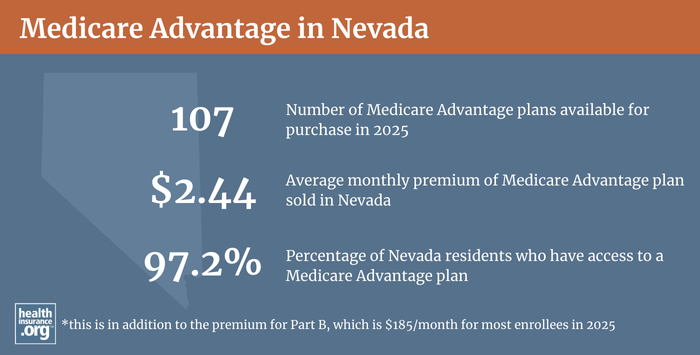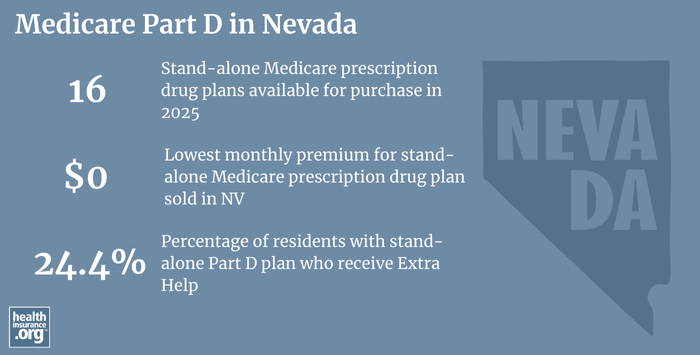Medicare in Nevada

New Nevada law gives Medigap enrollees an annual opportunity to switch to another plan, but Medigap coverage is not available to beneficiaries under 65
Key Takeaways
-
- More than 600,000 residents are enrolled in Medicare in Nevada.1
- 51% of Nevada Medicare beneficiaries are enrolled in Medicare Advantage plans.1
- Some counties in Nevada have no Medicare Advantage plans available; plan availability ranges depending on the county.2
- There are 16 stand-alone Part D prescription plans available in Nevada in 2025, with premiums that start at $0 per month.3
- More than 165,000 of the state’s Medicare beneficiaries have stand-alone Part D coverage.1

Medicare enrollment in Nevada
As of September 2024, there were 602,788 people enrolled in Medicare in Nevada,1 amounting to about 17% of the state’s population.4
Most Americans become eligible for Medicare enrollment when they turn 65. But Medicare eligibility is also triggered for younger people if they’re disabled and have been receiving disability benefits for 24 months (people with ALS or end-stage renal disease do not have to wait 24 months for their Medicare coverage to begin).
In Nevada, about 9% of Medicare beneficiaries (roughly 53,000 people) are younger than 65 and eligible for Medicare due to a disability rather than age.1 Nationwide, about 11% of all Medicare beneficiaries — roughly 7.1 million people — are eligible due to disability.5
Learn about Medicare plan options in Nevada by contacting a licensed agent.



Explore our other comprehensive guides to coverage in Nevada

We’ve created this guide to help you understand the Nevada health insurance options available to you and your family, and to help you select the coverage that will best fit your needs and budget.


Hoping to improve your smile? Dental insurance may be a smart addition to your health coverage. Our guide explores dental coverage options in Nevada.


Learn about Nevada’s Medicaid expansion, the state’s Medicaid enrollment and Medicaid eligibility.


Short-term health plans provide temporary health insurance for consumers who may find themselves without comprehensive coverage. Learn more about short-term plan availability in Nevada.

Frequently asked questions about Medicare in Nevada
What is Medicare Advantage?
In most areas of the United States, private Medicare Advantage plans are available as an alternative to Original Medicare.
In 2025, some of Nevada’s counties have no Medicare Advantage plans available for purchase.2
Medicare Advantage plan availability in 2025 in Nevada ranges from zero plans in several rural counties, to 38 plans in Clark County.2
By early 2023 the number of people enrolled in private Medicare plans in Nevada stood at 308,144 people;1 the other 294,644 beneficiaries had Original Medicare.1
People who enroll in Original Medicare get their coverage directly from the federal government, and have access to a nationwide network of providers. But Original Medicare enrollees need supplemental coverage (from an employer-sponsored plan, Medicaid, or privately purchased Medigap plans) for things like prescription drugs and out-of-pocket costs.
Original Medicare includes Medicare Part A (hospital inpatient services) and Part B (outpatient services). Medicare Advantage includes all of the benefits of Medicare Parts A and B, and the plans usually also have additional benefits, such as integrated Part D prescription drug coverage, dental and vision coverage, and extra programs like gym memberships and a 24-hour nurse hotline. But provider networks and service areas are limited with Medicare Advantage, and out-of-pocket costs (deductible, copays, and coinsurance) are often higher than they would be under Original Medicare plus a Medigap plan. There are pros and cons to either option, and no single solution that works for everyone.
Medicare’s annual election period (October 15 to December 7 each year) allows Medicare beneficiaries opportunities to switch between Medicare Advantage enrollment and Original Medicare (and add, drop, or change to a different Medicare Part D prescription plan). Medicare Advantage enrollees also have the option to switch to a different Advantage plan or to Original Medicare during the Medicare Advantage open enrollment period, which runs from January 1 to March 31 (only one plan change may be made during this window).

What are Medigap plans?
Original Medicare does not limit out-of-pocket costs, so most enrollees maintain some form of supplemental coverage. More than half of Original Medicare beneficiaries get their supplemental coverage through an employer-sponsored plan or Medicaid. But for those who don’t, Medigap plans (also known as Medicare supplement plans) will pay some or all of the out-of-pocket costs (deductible and coinsurance) they would otherwise have to pay if they had only Original Medicare.
According to the Nevada Division of Insurance, there were 101,096 Nevada residents with Medigap coverage as of 2022.6
Medigap plans are sold by private insurance companies, but the plans are standardized under federal rules. There are ten different plan designs (differentiated by letters, A through N), and the benefits covered by a particular plan (Plan G, Plan K, etc.) are the same regardless of which insurer sells the plan. This makes it easier for consumers to compare plans and make their choice based on factors such as price and customer service, knowing that the coverage will be the same regardless of which insurance company will provide the plan.
30 insurance companies offer Medigap plans in Nevada for 2025.7 Nearly all of them use attained age rating, which means that individual enrollees’ monthly premiums increase as they get older, regardless of how old they were when they purchased the policy.
Unlike other private Medicare coverage (Medicare Advantage and Medicare Part D plans), federal law does not provide an annual open enrollment window for Medigap plans. Instead, federal rules provide a one-time six-month window when Medigap coverage is guaranteed-issue. This window starts when a person is at least 65 and enrolled in Medicare Part B (you must be enrolled in both Part A and Part B to buy a Medigap plan). It’s essential to purchase coverage in a timely fashion during this window; if you apply for a Medigap plan after it ends, the insurance companies are allowed to use medical underwriting to determine your eligibility for coverage and your monthly premium.
But Nevada enacted legislation (AB250) in 2021 that provides Medigap enrollees with an annual opportunity to switch to a different plan. This provision took effect in 2022. It ensures that Medigap enrollees in Nevada have a 60-day window, starting the first day of their birthday month, during which they can switch to any other available Medigap plan that has equal or lesser benefits. Medigap plan change applications submitted during this window are guaranteed-issue, which means the application cannot be rejected and the insurer cannot increase the premium due to medical history (equal or lesser value means the plan can be at the same letter level as the one they have, or any of the lower levels, but not a higher level).
Several other states already had similar “birthday rule” annual plan change windows for Medigap enrollees, but the majority of the states do not. To be clear, anyone with Original Medicare can apply for any available Medigap plan at any time. But after the initial enrollment window has passed, insurers can use medical underwriting to determine whether the applicant is eligible for coverage. Nevada’s new law ensures that people with medical conditions aren’t stuck with their current Medigap plan forever. But it does not allow a person to upgrade to a more robust Medigap plan. And it also does not allow a Medicare beneficiary who doesn’t already have Medigap to enroll in a Medigap plan (after their initial enrollment window) on a guaranteed-issue basis.
People who aren’t yet 65 can enroll in Medicare if they’re disabled and have been receiving disability benefits for at least two years, or if they have ALS or end-stage renal disease; nearly 9% of Nevada Medicare beneficiaries are under age 65.1 But federal rules do not guarantee access to Medigap plans for people who are under 65. The majority of the states have implemented rules to ensure that disabled Medicare beneficiaries have at least some access to Medigap plans, but Nevada is not one of them.
Nevada does not require Medigap insurers to offer coverage to people under age 65. As of 2025, Nevada’s Medigap guide and Medicare.gov’s plan finder tool both indicate that there are no insurers that offers Medigap coverage to beneficiaries under the age of 65.7
As of 2022, there had been one company that did — State Farm Mutual Automobile Insurance Company — but their plans are no longer available as of 2023. And in previous years, Transamerica Life Insurance Company offered Medigap Plan A to enrollees under 65 in Nevada—albeit at a higher premium—but that appears to no longer be the case.
The Nevada Division of Insurance confirmed that there are no other supplemental coverage options for under-65 Medicare enrollees (ie, no state-run high-risk pool or similar program). But Medicare beneficiaries who are under age 65 do have the option to enroll in any available Medicare Advantage plan offered in their area. Medicare Advantage plans do have a cap on out-of-pocket costs, which Original Medicare does not, although beneficiaries may find that their access to medical providers is limited to a smaller network of doctors and hospitals if they use Medicare Advantage (note that the out-of-pocket cap does not include prescription drug costs, which do not have a maximum out-of-pocket cap regardless of whether the Part D coverage is purchased on its own or as part of a Medicare Advantage plan).
People who enroll in Medicare prior to 65 (due to a disability) do gain access to all of the available Medigap plans when they turn 65. At that point, they have the normal six-month open enrollment period for Medigap, with all plans guaranteed issue.
Although the Affordable Care Act eliminated pre-existing condition exclusions in most of the private health insurance market, those rules don’t apply to Medigap plans. Medigap insurers can impose a pre-existing condition waiting period of up to six months if you didn’t have at least six months of continuous coverage prior to your enrollment. And if you apply for a Medigap plan after your initial enrollment window closes (assuming you aren’t eligible for one of the limited guaranteed-issue rights), the Medigap insurer can consider your medical history in determining whether to accept your application, and at what premium.
What is Medicare Part D?
Original Medicare does not provide coverage for outpatient prescription drugs. More than half of Original Medicare beneficiaries have supplemental medical coverage via an employer-sponsored plan (from a current or former employer or spouse’s employer) and these plans often include prescription coverage.
But Medicare beneficiaries who do not have drug coverage through an employer’s insurance plan need to obtain Medicare Part D prescription coverage (Medicare beneficiaries who are dually-eligible for Medicaid will also have Part D coverage for their drugs). It can be purchased as a stand-alone plan, or as part of a Medicare Advantage plan with integrated Medicare Part D enrollment.
In 2025, there are 16 stand-alone Medicare Part D plans for sale in Nevada, with premiums that start at $0/month.3
As of September 2024, there were 168,431 Medicare beneficiaries in Nevada who were covered under stand-alone Medicare Part D plans.1 Another 294,483 had Part D prescription coverage integrated with their Medicare Advantage plans (this number has been increasing sharply as enrollment in Medicare Advantage plans has grown faster than overall Medicare enrollment in Nevada).1
Medicare Part D enrollment is available during the annual election period from October 15 to December 7. You may change your mind more than once during this window; the last plan you pick will take effect January 1 of the coming year.

How does Medicaid provide financial assistance to Medicare beneficiaries in Nevada?
Many Medicare beneficiaries receive financial assistance through Medicaid with the cost of Medicare premiums and services Medicare doesn’t cover – such as long-term care.
Our guide to financial assistance for Medicare enrollees in Nevada includes overviews of these benefits, including long-term care coverage, Medicare Savings Programs, and eligibility guidelines for assistance.
What additional resources are available for Medicare beneficiaries and their caregivers in Nevada?
Need help with your Medicare application in Nevada? Got questions about Medicare eligibility in Nevada? You can contact the Nevada State Health Insurance Assistance Program with questions related to Medicare enrollment in Nevada.
The Nevada Aging and Disability Services Division offers a variety of resources for Nevada Medicare beneficiaries.
The Governor’s Office for Consumer Health Assistance (OCHA) is part of the Nevada Department of Health and Human Services, and can provide advice, guidance, and information on a variety of health-related issues.
The Nevada Department of Health and Human Services website also has a resource page with information on programs available to help lower-income Medicare beneficiaries afford their coverage and healthcare.
The Medicare Rights Center is a national resource that includes a website and a call center where consumers throughout the United States can get answers to a wide range of questions about Medicare.
Louise Norris is an individual health insurance broker who has been writing about health insurance and health reform since 2006. She has written dozens of opinions and educational pieces about the Affordable Care Act for healthinsurance.org.
Footnotes
- “Medicare Monthly Enrollment – Nevada.” Centers for Medicare & Medicaid Services Data. Accessed January, 2025. ⤶ ⤶ ⤶ ⤶ ⤶ ⤶ ⤶ ⤶ ⤶ ⤶
- ”Medicare Advantage 2025 Spotlight: First Look” KFF.org Nov. 15, 2024 ⤶ ⤶ ⤶
- ”Fact Sheet: Medicare Open Enrollment for 2025” (86) Centers for Medicare & Medicaid Services. Sep. 27, 2024 ⤶ ⤶
- U.S. Census Bureau Quick Facts: United States & Nevada.” U.S. Census Bureau, July 2024. ⤶
- “Medicare Monthly Enrollment – US” Centers for Medicare & Medicaid Services Data. Accessed, January, 2025. ⤶
- ”The State of Medicare Supplement Coverage” AHIP. May 2024 ⤶
- “Explore your Medicare coverage options.” Medicare.gov. Accessed October, 2024. ⤶ ⤶

